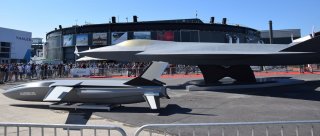Is Europe's Sixth-Generation Fighter In Trouble?
Reports indicated earlier this month that there’s trouble with the Future Combat Air System project, known in most defense circles as a sixth-generation fighter.
Reports indicated earlier this month that there’s trouble with the Future Combat Air System project, known in most defense circles as a sixth-generation fighter.
Established in 2017, with France, Germany, Dassault, Airbus, and Indra on board, the project was meant to establish a shared fighter jet for Europe, with the goal of completion by 2040. Spain, while not originally a participant, joined the project later on.
However, the governments of France and Germany are reportedly now at odds over multiple aspects of the project, including cost-sharing, jobs, and classified technology. France is also said to be “particularly sensitive about access to its nuclear-capable supply chain,” Popular Mechanics reported.
“It’s not a great development that after 4 years, France and Germany are still squabbling over how to work together. The project may ultimately fall apart, forcing the three countries to reassemble into a smaller coalition, team up with other countries, or work alone,” Reuters said of the dispute.
Now, Airbus has weighed in, declaring that there is “no plan B” for the project.
According to Defense News, Airbus executives appeared this week for testimony before the French Senate. The two executives — Antoine Bouvier, the head of Airbus strategy, mergers and public affairs, and Dirk Hoke, CEO of the aerospace giant’s defense division — were meant to "calm tensions boiling in the transitional program.”
The CEO of Dassault, the other major contractor for the program, had suggested a “plan B” for the project.
“My plan B does not necessarily consist in doing it alone, but in finding a method of governance that allows Europeans to be brought in, but not according to the rules set today, because that will not work,” Trappier said in early March testimony.
However, the Airbus executives were more skeptical about such a move.
“No alternative will make it possible to achieve the objective we have set for ourselves,” Bouvier said in the testimony, per Aerotime. “The competition is not between Europeans, but with China and the United States. [A defense industry] is fundamental for Europe.”
Hoke also called for an effort to “recreate a climate of trust and stop the controversies which pollute the debate.”
The Airbus executives also made it clear they’d like an agreement to solve the disputes by June, ahead of the next elections in Germany, as some political forces in Germany are opposed to the FCAS program.
The dispute was described by Defense One as follows: “some Germans think the French want to build a French airplane with German money, while some French think the Germans want to steal trade secrets and build a weapon of their own”- and French media has been trashing Germany’s motives in relation to the project.
Stephen Silver, a technology writer for The National Interest, is a journalist, essayist, and film critic, who is also a contributor to The Philadelphia Inquirer, Philly Voice, Philadelphia Weekly, the Jewish Telegraphic Agency, Living Life Fearless, Backstage magazine, Broad Street Review and Splice Today. The co-founder of the Philadelphia Film Critics Circle, Stephen lives in suburban Philadelphia with his wife and two sons. Follow him on Twitter at @StephenSilver.

